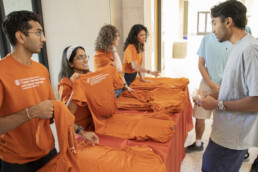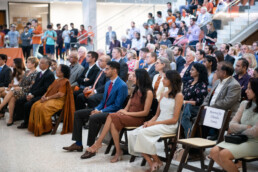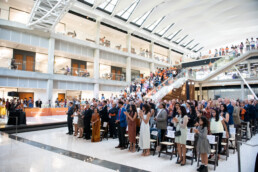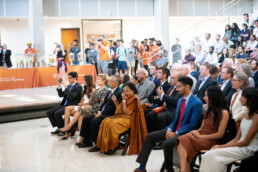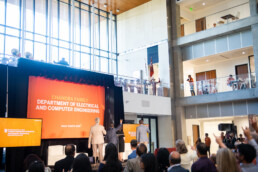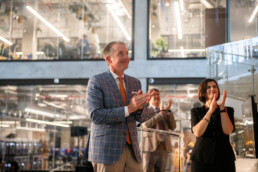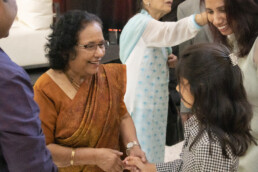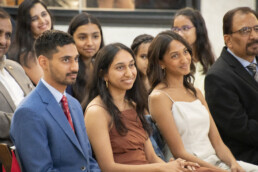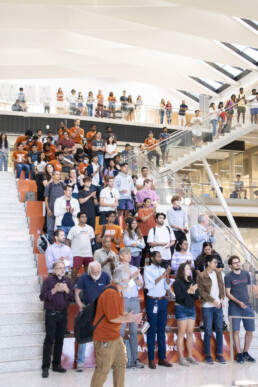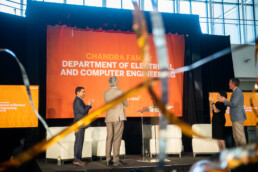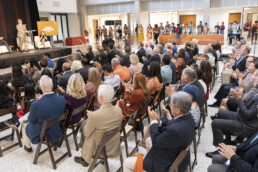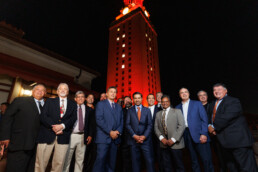by Nat Levy
We are entering a new era in computing, with tantalizing technologies on the precipice of transforming how we interact with electronics and even how the devices themselves think. The explosion of artificial intelligence, which has long been predicted but appears to be accelerating rapidly now with the popularity of programs like ChatGPT, opens the door for researchers to explore new opportunities in computing.
This past year, a transformative gift set the stage for the Cockrell School’s Department of Electrical and Computer Engineering (ECE) to become even more of a leader in this technological revolution. Already a national leader in research and education, with its programs consistently ranked among the top 10 in the country, it is the largest department in the Cockrell School, with more than 2,200 students and 80 faculty members.
Last fall, the department was renamed the Chandra Family Department of Electrical and Computer Engineering. Sanjay Chandra received a bachelor’s degree in electrical and computer engineering from UT Austin in 1987 and has served on the Cockrell School’s Engineering Advisory Board for many years, most recently as vice chair. He was named a Distinguished Engineering Graduate of the Cockrell School in 2016.
“We have many more leaders to shape, many more research breakthroughs to discover and many more lives to change — this is only the beginning for Texas ECE,” Sanjay Chandra said. “This is a pivotal time for the department, school, and university, and I’m honored to have the opportunity to help propel the Texas ECE community to new heights.”
The work of ECE researchers is propelling the next generation of computing. Several researchers are focused on the idea of neuromorphic computing, the fundamental reimaging of how computers think. This research discipline aims to recalibrate computers to process information more like people, as computing tasks continue to grow in complexity, reaching the limits of processing capabilities.
AI and related disciplines like machine learning are a major part of the department’s research, with nearly a dozen faculty members focusing on the topic, and numerous research centers focused on its development. ECE researcher Alex Dimakis is the co-director of the National Science Foundation-supported Institute for Foundations of Machine Learning. This $20 million research institute allows researchers to develop entirely new classes of algorithms that will lead to more sophisticated and beneficial AI technologies. As part of this project, UT Austin is leading a larger team of researchers that includes the University of Washington, Wichita State University and Microsoft Research.
The Chandra family’s gift will help to provide critical resources for graduate and undergraduate student programs and significant investments in faculty teaching and research. And it will help advance recent technological breakthroughs in these areas and many more.
The impact of Sanjay’s support will be felt and amplified for decades as the students and faculty who benefit from it change truly the world through their academic achievements and research breakthroughs,
said Diana Marculescu, chair of the department.
Sanjay and his wife, Manisha, have three adult children, Deepak, Shivani and Malini. Deepak received a bachelor’s degree in mechanical engineering from UT Austin in 2018. For the past 16 years, Sanjay Chandra has served as managing partner for Trinity Investors, a private equity firm based in Southlake, Texas, that invests in real estate and operating companies in a variety of sectors.
As a dedicated advocate for the value of higher education, Sanjay chose to give back to this department because of the powerful impact that his academic experiences had on his life and career,
said Roger Bonnecaze, dean of the Cockrell School of Engineering. Sanjay and his family have been a fixture within the Cockrell School community for many years. Through the resources and educational experiences made possible by his gift, Sanjay and his family will have a significant impact on our community and leave a lasting legacy in our school.
Sanjay Chandra insisted on the use of Chandra Family
as the name of the department because family is a core value of his.
I wouldn’t be here today without my parents,
Sanjay said. I’m a first-generation immigrant, and it is because of my parents’ incredible support that we were set up with an opportunity for success. I’m very thankful for their sacrifices, for it is largely because of their foresight to imagine a greater future for my brother and me that this gift is possible.
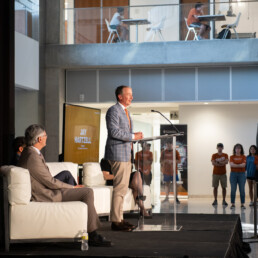
“Sanjay Chandra came to UT as the product of a remarkable family and he is bringing his journey full circle with a transformational commitment, dedicated to his family, that will have a profound impact on other longhorn families for generations.”
—Jay Hartzell, president, The University of Texas at Austin

